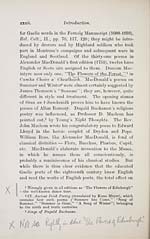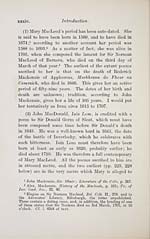Download files
Complete book:
Individual page:
Thumbnail gallery: Grid view | List view

Introduction. xxxiii
their way of thinking was vei-y slight : that remained
Gaelic. The poetry of the nineteenth century, with
some exceptions such as Alexander Mackinnon and
Allan MacDougall, shows increasing English influence
in style, thought, and metre. Much of this later poetry
is pretty and witty, but it has little of the old fire and
virility ; often, not without reason, it expresses the
wail of a dejected and harassed people. It is at this-
stage, and at no other, that the famous "Celtic
Gloom" is to be found in the literature, when the
social revolution was complete, and the Gaelic people
were left dependent, intellectually and economically,
on what was to them a foreign and distasteful culture.
The poetry that was inspired by the infamies of
Culloden and the Clearances could not be other than
gloomy. It is the more remarkable to note the spirit
of resilience that even still flares up from time to time
to remind us that the old battling buoyancy is not gone
after all.
VII.— THE BEGINNINGS OF MODERN POETRY.
Tlie classic poetry was syllabic ; the modem poetry
is usually^ regulated by stress, each line having a fixed
number of stressed syllables, or, in other words, a
certain rhythm. It has been held hitherto that the new
poetry originated with Mary MacLeod, Mairi Nighean
Alasdair Riiaidh, who quite suddenly, without
precedent or tuition, burst the fetters of tradition, and
invented rhythms of her own.^ This view will not stand
the test of historical enquii'y.
iNot aìicaijs, as will appear later.
2 Cf. Dr. M. Macleau, Literature of the Celts, p. 266; Rev. Dv
Maclean, Literature of the Scottish Gael, p. 18.
their way of thinking was vei-y slight : that remained
Gaelic. The poetry of the nineteenth century, with
some exceptions such as Alexander Mackinnon and
Allan MacDougall, shows increasing English influence
in style, thought, and metre. Much of this later poetry
is pretty and witty, but it has little of the old fire and
virility ; often, not without reason, it expresses the
wail of a dejected and harassed people. It is at this-
stage, and at no other, that the famous "Celtic
Gloom" is to be found in the literature, when the
social revolution was complete, and the Gaelic people
were left dependent, intellectually and economically,
on what was to them a foreign and distasteful culture.
The poetry that was inspired by the infamies of
Culloden and the Clearances could not be other than
gloomy. It is the more remarkable to note the spirit
of resilience that even still flares up from time to time
to remind us that the old battling buoyancy is not gone
after all.
VII.— THE BEGINNINGS OF MODERN POETRY.
Tlie classic poetry was syllabic ; the modem poetry
is usually^ regulated by stress, each line having a fixed
number of stressed syllables, or, in other words, a
certain rhythm. It has been held hitherto that the new
poetry originated with Mary MacLeod, Mairi Nighean
Alasdair Riiaidh, who quite suddenly, without
precedent or tuition, burst the fetters of tradition, and
invented rhythms of her own.^ This view will not stand
the test of historical enquii'y.
iNot aìicaijs, as will appear later.
2 Cf. Dr. M. Macleau, Literature of the Celts, p. 266; Rev. Dv
Maclean, Literature of the Scottish Gael, p. 18.
Set display mode to: Large image | Transcription
Images and transcriptions on this page, including medium image downloads, may be used under the Creative Commons Attribution 4.0 International Licence unless otherwise stated. ![]()
| Early Gaelic Book Collections > Matheson Collection > Bardachd Ghaidhlig > (37) |
|---|
| Permanent URL | https://digital.nls.uk/76422968 |
|---|
| Description | Specimens of Gaelic poetry 1550-1900. |
|---|---|
| Shelfmark | Mat.50 |
| Additional NLS resources: | |
| Attribution and copyright: |
|
| Description | Items from a collection of 170 volumes relating to Gaelic matters. Mainly philological works in the Celtic and some non-Celtic languages. Some books extensively annotated by Angus Matheson, the first Professor of Celtic at Glasgow University. |
|---|
| Description | Selected items from five 'Special and Named Printed Collections'. Includes books in Gaelic and other Celtic languages, works about the Gaels, their languages, literature, culture and history. |
|---|

